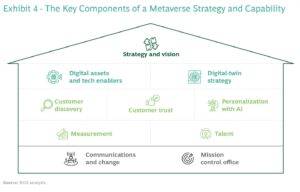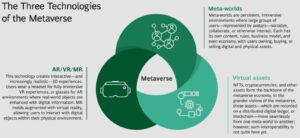By , Sumit Banerjee, Guy Gilliland, Christy Liu, Edwardo Sackey, , and Rob Trollinger
The metaverse is already a big part of business. It will only become more central.
As digital technologies move to the next stage of advancement—the metaverse—there are two questions companies should ask: How will the metaverse change our business? And how can we get ahead of the change and shape it to our advantage? This is our perspective on both.
The Data and Technology Universe
There’s plenty of debate about the definition of the metaverse, but we find it more useful to take a practical view and focus on the productive use cases that it enables. The metaverse is based on the convergence of multiple technologies and the proliferation of data and content, which combine to create value for users. In the case of consumers, the result might be a virtual-reality (VR) gaming platform, while for business it could be a machine-learning algorithm that incorporates multiple diverse data sets to provide better insights and improve decision making.
In this sense, the metaverse encompasses broad categories of technology (including computing, connectivity, artificial intelligence, and machine learning) that come together in rich ways to create new and unprecedented value. It’s an aircraft engine technician connecting via the company’s help line to an expert 3,000 miles away. It’s the digital twin of an electrical grid that highlights maintenance needs or security vulnerabilities. It’s a smartphone app that integrates with an augmented-reality-enabled windshield to serve up driving directions, which it feeds to the car’s self-driving algorithms. It’s the technology that enables emergency services to respond when a phone or watch belonging to an injured person automatically sends an SOS.
It’s hard to pinpoint where the metaverse ends. It is flourishing, in part, thanks to continuing advancements in technologies such as augmented reality (AR) and VR, big data, artificial intelligence, machine learning, and blockchain. Just as our understanding of the universe and what it encompasses has been vastly expanded by the Hubble space telescope, the nature of the metaverse is a work in progress. Were we able to define its boundaries today, some future technological advance would almost certainly cause us to reassess.
If the metaverse seems a bit amorphous, its use cases are easier to spot and are multiplying fast. (See Exhibit 1.) Many companies already see the metaverse as an opportunity to connect with consumers in new ways. But for both B2C and B2B enterprises, it really represents a new way to do business and an opportunity to reinvent everything from customer journeys to operational processes. We can point to dozens of use cases for companies in all sectors and industries—and the technology underlying these applications is still only in its infancy. Their impact ranges from greater convenience and efficiency (remote maintenance, for example) to the life-changing and disruptive (enhanced surgical assistance and in-home health care). The new use cases can lead not just to quicker and easier ways of doing things but to whole new industries and business models.
More: BCG Metaverse Services

